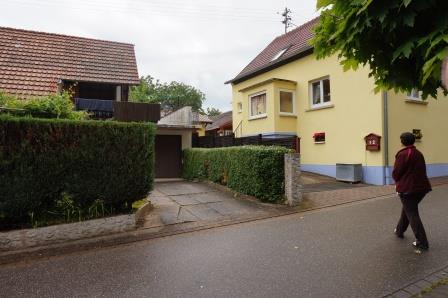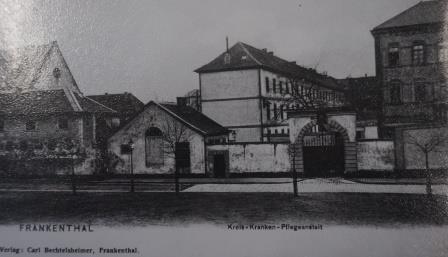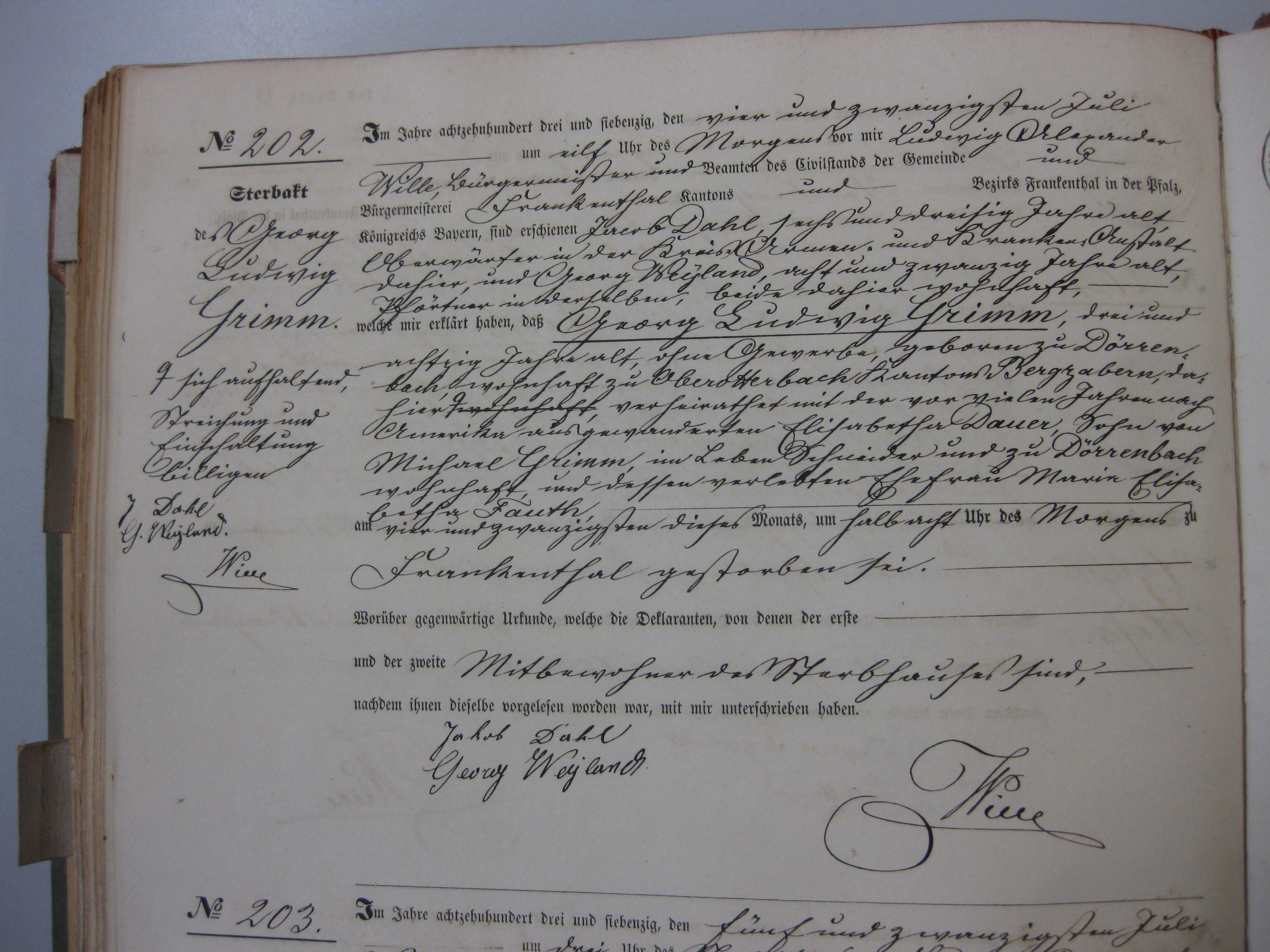
Georg Ludwig Grimm was born 17 Dec. 1789 in Dörrenbach, Bergzabern, Pfalz, Germany to Johann Michel Grimm d. 1821 and Maria Elisabetha Fauth, d. 1799, both of whom died in Dörrenbach.
Dörrenbach is an absolutely gorgeous village, known as the site of the origination of the SLEEPING BEAUTY fairytale.
It’s also on the Wine trail (known in those parts for Riesling, Müller -Thurgau, Chardonney, Pinot Gris, Pinot Blanc, Dornfelder, merlot, St. Laurent, and Regent; and on the St. James pilgrimage trail (of which we hiked 11 miles in the Saarland) which connects to the more familiar Santiago de Campostela. So, great hiking, wine and literature — do you need more reason to visit???? The Grimm brothers were, as far as we know, no relations. BUT they probably were waaaay back someplace, due to the paternal line name.
Our Grimms were evidently quite poor because a search of the notarial records had nothing for Johann Michel for the last twenty or so years of his life. At any rate, G. Ludwig was christened on the 19th of December in the Lutheran Church.

A few months after his father died, On 1 Nov 1821 in Dörrenbach, Georg Ludwig (30 years old) married a Catholic woman, Elisabeth Dauer born about 1800 in Birkenhordt). Elisabetha was also a poor woman, since she was the daughter of an itinerant herdsman, Johannes Dauer. A herdsman would typically not own his own home; it would be provided for him by the town that hired him as part of his pay.
Elisabeth and G. Ludwig had four children: Georg Michel b. 1822, Susanna b. 1823, Philipina b. 1825 and Eva Margarethe b. 1828 died 1832. Eva Margarethe was baptized Catholic, as would be the custom if the mother was Catholic, the girls would be baptized Catholic. As noted below, G. Ludwig did not sign the baptismal record. We know that Eva Margarethe died in Oberotterbach. Unfortunately, the records (marriage) for the other two daughters were stored on the floor that was sealed for construction in Speyer.
Two months after his marriage, Ludwig and Elisabetha had a son, Georg Michel Grimm, in neighboring village, Oberotterbach. The other daughters were also born in Oberotterbach where Ludwig was a “vineyard-man.” Couple that with other records that mention he is a day laborer, I believe that means he worked the vineyards, pruning, harvesting, etc.
The 2014 owner of the house came outside with his wife and chatted with us about the property that had been destroyed in WW2. The historian of Oberotterbach told us that the Americans used phosphorus bombs heavily at the end of the war, when this was the front line, and those bombs started fires. Since most of the homes were built from wood, and were built close together, the fires spread quickly. Estimates of more than 70% of the homes were destroyed, including the home Georg Michel Grimm grew up.

Georg Ludwig Grimm was a daylaborer. His property record documents that he owned two fields only. The house with a vegetable garden was registered in the name of his children. It was bought for 140 guilders in 1829, and sold for the same amount in 1846. The records state that Ludwig was a farmer and a day laborer and was very poor, perhaps due to mental issues, since he was sent to the sanitoria in the hospital north of Mannheim for the last twenty or thirty years of his life.
In his son, Georg Michel’s conscription notice (Franco-Prussian War), it says: the value of his parents’ wealth is given as 328 guilders, which includes house, land, and movables.
There are some other odd notes about 3rd great-grandfather Grimm, such as that he never signed the birth record of his daughter Eva Margarethe or that the homes he lived in were not under his name, but under his children’s names. Sometimes that meant that the house was inherited through the wife’ family, but we know that is not the case with her, since they bought the house outright. It could also simply mean that he was illiterate, but the fact that he ended up in a sanitoria makes me think that it was due to his other issues.
 We don’t know when G. Ludwig moved to the Frankenthal sanitoria. Unfortunately, the church books there were destroyed in the war. We were able to speak with the archivist for the Frankenthal city records and he was quite helpful, giving us information about the place where G. Ludwig lived. The reason that 3rd-g. grandfather moved so very far away from his home town was that that was the only mental hospital around. Later, one was built relatively close to Dörrenbach, but it wasn’t in existence when grampa needed it.
We don’t know when G. Ludwig moved to the Frankenthal sanitoria. Unfortunately, the church books there were destroyed in the war. We were able to speak with the archivist for the Frankenthal city records and he was quite helpful, giving us information about the place where G. Ludwig lived. The reason that 3rd-g. grandfather moved so very far away from his home town was that that was the only mental hospital around. Later, one was built relatively close to Dörrenbach, but it wasn’t in existence when grampa needed it.
At any rate, the the private sale of the family home in 1846 indicates that the family left Oberotterbach and furthermore, that the children did not inherit anything (physical!) from their parents. However, one of the fields that was owned by Georg Ludwig was transferred to a new owner in 1855/56 only. The sale in 1846 was noted as a private sale arranged by the two families involved. Getting a notary to procure the sale would have cost a bit, and since they didn’t use one, it was another indication that he was poor and possibly that they had nothing else to sell and needed money. The furniture was also auctioned, which indicates that the family was leaving the area.
What happened to Ludwig’s wife, Elisabetha Dauer Grimm and his daughters, Susanna and Phillipina Grimm? It is noted in Georg Ludwig’s death record in Frankenthal that his wife had emigrated many years earlier. There was another Grimm family in Oberotterbach and they emigrated in 1835….he could have been a brother of Georg Ludwig (Johannes or Georg Michel are not confirmed, possibilities). We did search the Oberotterbach emigration records for Elisabetha’s emigration and came up nil.
Georg Ludwig died in 1873 in the Sanitoria in Frankenthal, Germany. His death record is transcribed by Uwe Porten as follows: Transcript of an excerpt from the register of deaths of the city of Frankenthal of the year 1873, that was submitted to the undersigned civil registrar, whose original is recorded in the registers of deaths of the city of Frankenthal by number 202, record on the death of Georg Ludwig Grimm. In the year of 1873, on the 24th of July, at 11 o’clock in the morning, there appeared before me, Ludwig Alexander Wille, mayor and civil registrar for the town and municipality of Frankenthal, in the county and district of Frankenthal, in the Palatinate, Kingdom of Bavaria: Jakob Dahl, 36 years of age, senior warden in the local county poorhouse and hospital, and Georg Weihland, 28 years of age, porter thereat, both domiciled at this place. They declared to me that Georg Ludwig Grimm, 83 years of age, without particular occupation, a native of Dörrenbach, domiciled in Oberotterbach in the county of Bergzabern, staying at this place, married to Elisabetha Dauer, who emigrated to America seven years ago, son of Michael Grimm, who during his lifetime was a tailor and domiciled in Dörrenbach, and his late wife Maria Elisabetha Fauth, died in Frankenthal on the 24th of this month, at ½ 8 o’clock in the morning. The declarants, which of the first as well as the second one are co-inhabitants of the house where he died, signed this record with me after it was read aloud. In 2014, we spoke with the archivist for Frankenthal who explained to us that this particular part of the hospital/poor house was for people with mental issues.

Leave a Reply